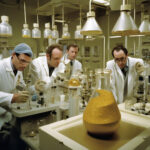In response to the escalating concerns around plastic pollution, a groundbreaking initiative has emerged, aiming to revolutionize the packaging industry with 100% compostable plastics. The Bioplastics Innovation Hub, backed by an $8 million investment, unites industry leaders, researchers, and innovators with a clear mission: to accelerate the development and commercialization of eco-friendly packaging solutions.
The predominant focus of this collaboration is to create biodegradable plastics that can degrade fully in diverse environments, including compost, land, and water. Dr. Andy Whiteley, the Research Program Director at CSIRO, underlines the hub’s goal, stating, “Our primary focus is the development of 100% compostable, bio-derived packaging for use as sprays, films, bottles, caps, and wrappers, engineered to fully break down in compost, land, and aquatic environments.” This vision aligns perfectly with the increasing global demand for sustainable alternatives, highlighting the urgency for the plastics industry to pivot towards compostable options.
One of the most significant projects coming out of the Bioplastics Innovation Hub is a collaboration with Ecopha Biotech, a biotechnology company based in Western Australia. Together, they are pioneering an innovative approach to manufacturing compostable plastic water bottles using waste products generated from the food industry. This initiative seeks to introduce truly compostable plastic bottles to the market, which would replace traditional non-biodegradable plastics that exacerbate environmental pollution. CEO of Ecopha Biotech, Dr. Wilson Ling, emphasizes the importance of this endeavor, declaring, “Through the Bioplastics Innovation Hub, we are focused on developing bioplastics that will help address the plastic waste problem both in Australia and globally.”
This initiative is also in alignment with CSIRO’s ambitious aim of reducing plastic waste in Australia by 80% by the year 2030. This objective resonates with Australia’s National Plastics Plan and the United Nations Global Treaty on Plastic Pollution, both of which seek comprehensive strategies to combat the environmental perils posed by plastic waste.
Moreover, Professor Peter Eastwood, Deputy Vice-Chancellor of Research and Innovation at Murdoch University, shed light on a key component of this project: technological innovation. He remarked, “Together with CSIRO, Murdoch University will fast-track the production of novel compostable bioplastics, introducing a green plastic to the market that will significantly minimize the need for unsustainable plastic production.” Through these efforts, the initiative strives not only to create new products but also to foster advanced biomanufacturing sectors that can commercialize these solutions effectively.
The collaborative nature of the Bioplastics Innovation Hub leverages the strengths of various stakeholders, including government bodies, researchers, industry leaders, and innovators. By pooling resources and expertise, the hub aims to pave the way for a more sustainable future, creating a circular economy that significantly reduces environmental harm. As plastic pollution continues to wreak havoc on ecosystems worldwide, initiatives like the Bioplastics Innovation Hub represent a vital step towards meaningful change.
The potential impacts of this initiative are profound. By focusing on compostable solutions, the Bioplastics Innovation Hub endeavors to create a lasting difference in combating plastic pollution. Whether it’s through revolutionary new packaging for consumer products or innovative methods of utilizing waste materials, the Hub’s comprehensive approach highlights the transformative power of collaboration in addressing one of the most pressing issues of our time.
As we look ahead, the success of the Bioplastics Innovation Hub could set a precedent for future innovations in sustainable materials. It serves as an encouraging reminder that with concerted efforts, it is possible to create alternatives that not only meet consumer needs but also protect our planet. The introduction of compostable plastics could mark a significant turning point in the fight against plastic pollution, demonstrating that sustainability and practicality can indeed go hand in hand.
With major global players prioritizing sustainability, investing in similar initiatives becomes crucial for businesses looking to adapt and thrive in a changing market landscape. Companies that follow the Bioplastics Innovation Hub’s example could secure their position as leaders in the green economy, cultivating loyalty among environmentally conscious consumers.
To conclude, the Bioplastics Innovation Hub stands as a beacon of hope in the struggle against plastic pollution. With its focused research, innovative projects, and collaborative spirit, it pushes the boundaries of what’s possible in creating a more sustainable packaging industry. As the world watches eagerly, the outcomes of this initiative may well herald a new era of biodegradable materials that align with the principles of environmental stewardship.












